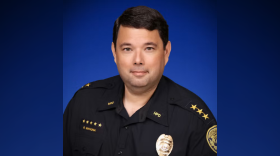In a first for the county, the Hawaiʻi Island Police Department underwent a one-day Micronesian training program to educate officers on common misconceptions associated with the culture.
The one-day event was conducted by the nonprofit Hawaiʻi Island Community Health Center, Micronesian leaders and cultural experts.
Hawaiʻi Island Police Capt. Roy Valera said he had been asking for the training since 2018, but nothing came to fruition until now.
He said the program offered an open dialogue for officers to ask questions on Micronesian culture.
“Some of the things that I know some of the officers had were preconceived notions or normative beliefs about Micronesian culture,” he said. “ Sometimes with normative beliefs, they are not necessarily based on fact and it's sometimes just assumptions that people have made or concepts that aren't really understood.”
The training included a history lesson on why Micronesians are in the state, a debunking of myths and misperceptions, and time to think about future partnerships.
More than 18,000 Micronesians are living in Hawai‘i. Many families migrated from Palau, the Federated States of Micronesia and the Marshall Islands. These Pacific Nations share treaties with the U.S. called the Compacts of Free Association.
Micronesians can travel to the U.S. without a visa, often coming for work, education and health care. In exchange, the U.S. military can gain access to the islands’ surrounding water and air space.
However, many Micronesians have faced implicit bias and discrimination in Hawai‘i.
Lee-Ann Noelani Heely, the director of the nonprofit’s Department of Health Equity, said the training provided a chance for a better understanding of the community.
"No one was shocked nor were they offended during this training,” she said. “Simply because we had set the stage and we had set ground rules in terms of, 'We’re here to meet one another to help to understand one another a little better.'”
The training was volunteer-based, but Heely said she wants it to be conducted on a quarterly or annual basis.
Valera said he would want Micronesian culture training to be offered during their academy for incoming officers.
“I think this training was a great first step,” he said. “I would like to see what it eventually becomes, as far as continuing training or additional branches of training with other cultures, and any type of training that we can offer our officers to enable them to work collaboratively with our community members is the biggest reward.”
Despite it being a first for Hawaiʻi Island, Micronesian culture training isn’t new to the state.
Josie Howard of the nonprofit We Are Oceania offered a culture-based training program to the Honolulu Police Department in 2021. This came after the fatal shooting of Iremamber Sykap, a 16-year-old Micronesian boy, by HPD officer Geoffrey Thom.
Howard said she had the HPD meet with community members, including grassroots organizations and church groups.
“I know we can never stop something like this from happening, but (training) can reduce this type of incident and save our youth,” she said.

She spoke more of the Chuukese community, where she's from, and how police officers and residents would often intermingle.
“Everybody’s related so it’s a little different. Where the police officers come to your house may be your uncle or may be your cousin. So there’s a different way of responding,” she said.
But she said with COFA citizens moving to Hawaiʻi, it is more difficult to establish those relationships as strangers, especially while navigating the language barrier.
“When it comes to language barriers and you don't know the person and you don’t understand the nuances, it really adds to your disorientation and your fear and intimidation,” she said.
Howard said the key to mending tension and misunderstanding is to build relationships. She said she hopes more Micronesian youth will get into law enforcement to help bridge that gap.
With new leadership at the Honolulu Police Department, Howard said she wants to restart the training program and is hopeful it can someday be offered statewide.






